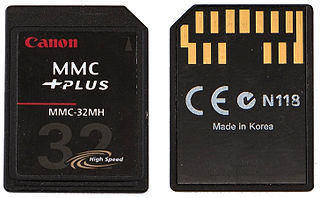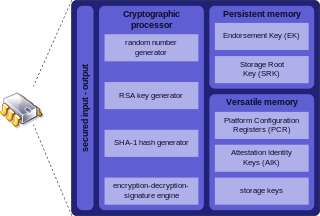
In computing, BIOS is firmware used to provide runtime services for operating systems and programs and to perform hardware initialization during the booting process. The firmware comes pre-installed on the computer's motherboard.

Open Firmware is a standard defining the interfaces of a computer firmware system, formerly endorsed by the Institute of Electrical and Electronics Engineers (IEEE). It originated at Sun Microsystems where it was known as OpenBoot, and has been used by multiple vendors including Sun, Apple, IBM and ARM.

MultiMediaCard, officially abbreviated as MMC, is a memory card standard used for solid-state storage. Unveiled in 1997 by SanDisk and Siemens, MMC is based on a surface-contact low-pin-count serial interface using a single memory stack substrate assembly, and is therefore much smaller than earlier systems based on high-pin-count parallel interfaces using traditional surface-mount assembly such as CompactFlash. Both products were initially introduced using SanDisk NOR-based flash technology.
Hardware abstractions are sets of routines in software that provide programs with access to hardware resources through programming interfaces. The programming interface allows all devices in a particular class C of hardware devices to be accessed through identical interfaces even though C may contain different subclasses of devices that each provide a different hardware interface.
JTAG is an industry standard for verifying designs of and testing printed circuit boards after manufacture.

Unified Extensible Firmware Interface is a specification that defines an architecture for the platform firmware used for booting a computer's hardware and its interface for interaction with the operating system. Examples of firmware that implement the specification are AMI Aptio, Phoenix SecureCore, TianoCore EDK II, InsydeH2O.

In the context of installing firmware onto a device, a programmer, device programmer, chip programmer, device burner, or PROM writer is a device that writes, a.k.a. burns, firmware to a target device's non-volatile memory.

The USB mass storage device class is a set of computing communications protocols, specifically a USB Device Class, defined by the USB Implementers Forum that makes a USB device accessible to a host computing device and enables file transfers between the host and the USB device. To a host, the USB device acts as an external hard drive; the protocol set interfaces with a number of storage devices.
Advanced Configuration and Power Interface (ACPI) is an open standard that operating systems can use to discover and configure computer hardware components, to perform power management, auto configuration, and status monitoring. It was first released in December 1996. ACPI aims to replace Advanced Power Management (APM), the MultiProcessor Specification, and the Plug and Play BIOS (PnP) Specification. ACPI brings power management under the control of the operating system, as opposed to the previous BIOS-centric system that relied on platform-specific firmware to determine power management and configuration policies. The specification is central to the Operating System-directed configuration and Power Management (OSPM) system. ACPI defines hardware abstraction interfaces between the device's firmware, the computer hardware components, and the operating systems.
In computing, serial presence detect (SPD) is a standardized way to automatically access information about a memory module. Earlier 72-pin SIMMs included five pins that provided five bits of parallel presence detect (PPD) data, but the 168-pin DIMM standard changed to a serial presence detect to encode more information.

Trusted Platform Module (TPM) is an international standard for a secure cryptoprocessor, a dedicated microcontroller designed to secure hardware through integrated cryptographic keys. The term can also refer to a chip conforming to the standard ISO/IEC 11889. Common uses are to verify platform integrity, and to store disk encryption keys.
A Bluetooth stack is software that is an implementation of the Bluetooth protocol stack.

The Open NAND Flash Interface Working Group is a consortium of technology companies working to develop open standards for NAND flash memory and devices that communicate with them. The formation of ONFI was announced at the Intel Developer Forum in March 2006.

Spansion Inc. was an American-based company that designed, developed, and manufactured flash memory, microcontrollers, mixed-signal and analog products, and system-on-chip (SoC) solutions. The company had more than 3,700 employees in 2014 and was headquartered in Sunnyvale, California. Spansion was a joint-venture between AMD and Fujitsu.
Universal Flash Storage (UFS) is a flash storage specification for digital cameras, mobile phones and consumer electronic devices. It was designed to bring higher data transfer speed and increased reliability to flash memory storage, while reducing market confusion and removing the need for different adapters for different types of cards. The standard encompasses both packages permanently embedded within a device (eUFS), and removable UFS memory cards.

UniPro is a high-speed interface technology for interconnecting integrated circuits in mobile and mobile-influenced electronics. The various versions of the UniPro protocol are created within the MIPI Alliance, an organization that defines specifications targeting mobile and mobile-influenced applications.

SeaBIOS is an open-source implementation of an x86 BIOS, serving as a freely available firmware for x86 systems. Aiming for compatibility, it supports standard BIOS features and calling interfaces that are implemented by a typical proprietary x86 BIOS. SeaBIOS can either run on bare hardware as a coreboot payload, or can be used directly in emulators such as QEMU and Bochs.
NVM Express (NVMe) or Non-Volatile Memory Host Controller Interface Specification (NVMHCIS) is an open, logical-device interface specification for accessing a computer's non-volatile storage media usually attached via the PCI Express bus. The initial NVM stands for non-volatile memory, which is often NAND flash memory that comes in several physical form factors, including solid-state drives (SSDs), PCIe add-in cards, and M.2 cards, the successor to mSATA cards. NVM Express, as a logical-device interface, has been designed to capitalize on the low latency and internal parallelism of solid-state storage devices.
XMC is a family of microcontroller ICs by Infineon. The XMC microcontrollers use the 32-bit RISC ARM processor cores from ARM Holdings, such as Cortex-M4F and Cortex-M0. XMC stands for "cross-market microcontrollers", meaning that this family can cover due to compatibility and configuration options, a wide range in industrial applications. The family supports three essential trends in the industry: It increases the energy efficiency of the systems, supports a variety of communication standards and reduces software complexity in the development of the application's software environment with the parallel released eclipse-based software tool DAVE.
WebUSB is a JavaScript application programming interface (API) specification for securely providing access to USB devices from web applications.










